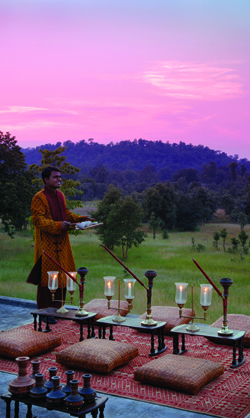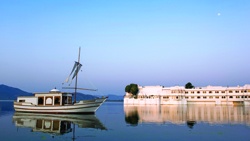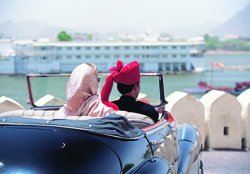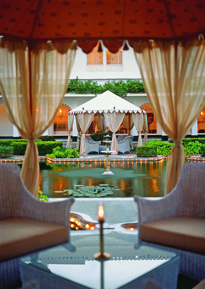- Home
- Media Kit
- Current Issue
- Past Issues
- Ad Specs-Submission
- Ad Print Settings
- Reprints (PDF)
- Photo Specifications (PDF)
- Contact Us

![]()
ONLINE

An Emotional Attachment
Editors’ Note
Ashish Sanghrajka is a native of Kenya, born into the tourism and travel industry under the tutelage of his father, Mahen Sanghrajka, who founded Big Five Tours & Expeditions initially as a safari operator in East Africa 36 years ago. In 1985, as Big Five Tours & Expeditions continued growing, the Sanghrajka family relocated to New York City. Sanghrajka later attended the University of Arizona in Tucson and graduated with a degree in political science, with a focus on international economics. Sanghrajka entered the business world as an economics analyst and trainer at Charles Schwab & Co., but formally rejoined the family business in 2002, first as Director of the Asia product, and then as Vice President of Sales and Partner Relations, before ascending to his current post in 2008.
Company Brief
In business for over 35 years, Big Five Tours & Expeditions (www.bigfive.com) offers customized luxury travel for individuals and groups. Their journeys are tailor-made to any of their exotic destinations in Africa, Asia, the Orient, Latin America, polar regions, and South Pacific. In addition, their 24-hour White Glove Service™ guest assistance desk is manned by a team of specialists available 365 days from anywhere in the world. The company has been consistently awarded World’s Best Tours Operators and Safari Outfitters by Travel+Leisure magazine since 1999.
Are you happy with the brand awareness and the understanding of both the level of service and the type of value that Big Five Tours & Expeditions offers?

Big Five Tours & Expeditions arranges
excursions to exotic destinations such
as Mahua Kothi lodge at the
Bandhavgarh National Park (above) and
Taj Lake Palace in Udaipur (below),
both in India
More so than I was three years ago. We developed from a family business into a corporate organization that has kept family values. But we were trying to figure out who we were, ever since 2001. The ’90s were so busy for us, so we never took time to take stock of who we were. The one thing that came out of 9/11 was it allowed us to take stock of who we were. In 2004, we went through a complete re-branding where we changed our logo, and defined to ourselves who we were.
Once that occurred, we started getting the brand in place. The missing link was creating that household name. We realized that advertising is part of it, but more so, it’s about focusing on customer service, about becoming such a legend at what you do that people start taking notice, and that’s what we focused on.
You’ve brought on new services – you now have a concierge service. Was that a natural extension?
Any company can add a concierge, but we took it one step further. We measure our guest satisfaction rates on a weekly basis, and one of the things we kept seeing was guests having minor issues with things like disliking the duvets on the beds. But they weren’t calling our 24-hour service to complain. We thought it didn’t matter to them, but when we actually spoke with them, we found situations when there was frustration getting to the destination, that what was taking one to two days to decompress when you get to the destination was now taking almost seven to eight days; by the time they were fully decompressed, they were on their way home. These issues were not brought to our attention, which didn’t make sense to us.

So we decided to offer more than a concierge – something where if they have a need, they can call and get a live person from a team we personally trained who has a copy of their itinerary.
But in addition, our concierge service – the 24-hour White Glove Service desk – proactively calls every single guest while they’re on tour, to wish a Happy Father’s Day, for example, and see how things are going. During a downturn, one of the first things to always go is service because you start letting go of your staff and you’re worried about profits and you start forgetting what kind of damage you’re doing to your customer base.

How does the opportunity to customize a tour evolve with a client?
Somebody can look at our sample tours and see a combination of different things they want to put together; or they can dream up something they want us to put together; or they give us a blank check and ask us to tell them where to go.
For somebody who has done it all, we’d suggest, for example, taking the client to the tallest building in Auckland to go BASE-jumping; or going up in a World War II Mustang in aerobatic flight; or going through India in a private jet and touring in vintage vehicles; or even going up in South Africa in a fighter jet at Mach 1.
We’ve had people who contacted us with just three lines about what they’re doing and we gave them a 10-page proposal.

For 2010, what are the key areas in the forefront of your mind to make sure the business continues the growth and maintains a leadership position?
We’ve signed many new structured agreements and focused in on these agreements. We’ve been able to widen our reach and awareness, because while during a downturn, one of the first things companies cut is marketing, one of the areas we have not cut is marketing; now is the time when everybody is listening.
There is a lot of uncertainty in terms of political climates that affect our business, but during a downturn, luxury travel is the last thing to be cut, and it’s usually the one that is cut only by necessity and it’s most often the first thing to start. Although a recession was mathematically declared at the end of 2007, we grew in 2008; 2009 was our first drop year. So we’re expecting 2010 to return. Now that we have everything in place, our sole focus for 2010 is execution. In terms of acquisitions, we opened an office in Canada in the height of a downturn and we looked like fools for doing it, but now, people are looking at it like a good move because all of the initial steps we needed to take for an acquisition or venture are out of the way.
Is it challenging to get the true definition of the word luxury out, and is it understood that luxury can also mean value?
Yes, it’s a very big challenge. Putting luxury and value together in the same sentence is like mixing oil and water. Luxury is such an overused term, and people used to think of it as excess and extra costs, and it is being redefined.
For us though, the redefinition has to focus on the emotional attachment. Our trips are not commodities, and if you don’t have an emotional attachment, then they are just that. So we focus in on the service side of it. We do offer the high-end hotels and tours and that does go along with luxury. But for us, the true definition of luxury is an emotional attachment, because if you’re willing to pay for something, you need to get something you’ll never get anywhere else.